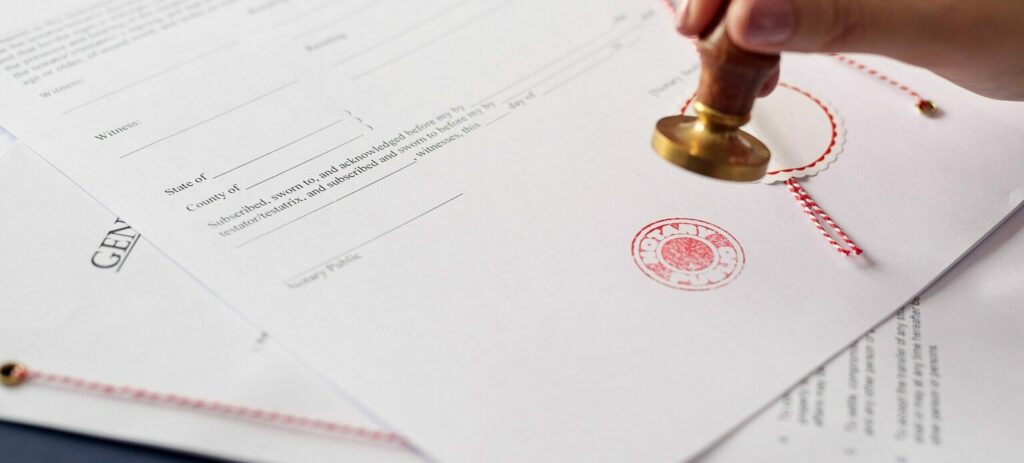Your birth certificate is a foundational document. After all, it’s essential proof of who you are, where you were born, and your citizenship. Throughout life, you’ll likely need copies of this vital record for numerous official purposes – enrolling in school, applying for a passport, securing government benefits, or navigating legal processes.
When asked for a copy, people often wonder about adding an extra layer of officialdom, leading to the concept of a “notarized birth certificate.”
But is this actually the correct way to authenticate your birth certificate, and what role, if any, does a notary public truly play? This article aims to clarify the confusion surrounding this term and guide you to the proper procedures for authenticating this extremely important document.
A notarized birth certificate? Clarifying misconceptions

While many people use this phrase, thinking they can take their birth certificate or a copy of it to a notary public to be stamped and signed, this is generally not how it works. You typically cannot get a birth certificate itself notarized by a notary public in the way you would notarize a signature on a contract or swear an oath for an affidavit.
Why so? Because birth certificates are classified as public records or vital records. They are original documents held and issued by a specific government agency responsible for maintaining these official records.
State laws widely restrict notaries public from certifying copies of public records if the official custodian of that record (the government agency itself) can provide certified copies.
Since the Department of Health or Vital Records office in your state can provide certified copies of birth certificates, notaries are generally prohibited from creating their own certified copy using their notary seal.
Notarization, fundamentally, involves a notary public acting as an impartial witness to a signature or administering an oath, or in some cases, certifying a copy of a private document (where state law allows). Authenticating a government-issued public record falls outside the typical scope of a notary’s authority.
When people ask for a “notarized birth certificate,” they are almost always trying to achieve an officially recognized copy that proves its authenticity. However, to reiterate, a notary applying their seal to a photocopy of a birth certificate does not achieve this legal recognition.
The correct way of authenticating your birth certificate

So, if you can’t get a “notarized birth certificate” from a notary public, what is the correct and legally accepted method to authenticate it for official use? The answer is simple: you must obtain a certified copy directly from the government agency that originally issued the birth certificate.
These certified copies of birth certificates are considered the official and legally accepted proof of the birth record. They are not photocopies made and certified by a third party, but instead original copies produced directly from the official records held by the government.
Who issues certified copies of a birth certificate?
The proper authorities for obtaining a certified copy of a birth certificate are the government agencies responsible for vital records in the state or territory where the birth occurred. This is typically:
- The State Department of Health or the Bureau of Vital Records;
- In some cases, a local County Health Department may also be authorized to issue certified copies.
You must contact the specific government entity in the place of birth to request an official certified copy.
Obtaining a certified copy: what is the process like?

Obtaining a certified copy is a standardized process, although the specifics might vary slightly by state or county. Generally, you will need to:
- Submit a request form (often available online, by mail, or in person);
- Provide necessary information about the person whose birth certificate is being requested (name, date of birth, parents’ names);
- Prove your identity and your relationship to the person on the birth certificate (often requires providing your own identification);
- Pay the required fee for the certified copy.
When you receive a certified copy of a birth certificate from the issuing agency, it will have specific security features and markings that distinguish it as an official record.
This includes a raised or embossed official seal of the issuing office, the signature of the registrar or clerk, and is often printed on special security paper to prevent counterfeiting. These features are what make it a legally accepted document.
The notary’s actual role and the services they provide

Given that a notary public cannot notarize a birth certificate itself, does that mean a notary is completely irrelevant when dealing with birth certificates? Of course not!
While they cannot authenticate the birth certificate copy by placing their seal directly on it, notaries public can be involved in processes related to obtaining or using a certified birth certificate.
Here are some instances where a notary public might play a role:
- Notarizing affidavits or sworn statements: you might need to submit an affidavit (a sworn written statement) that references or is supported by your birth certificate. For example, an affidavit of identity or an affidavit explaining a discrepancy in names might require your signature to be notarized. In this case, the notary is notarizing your signature on the affidavit, not the birth certificate itself. You would typically attach the certified birth certificate as an exhibit to the notarized affidavit.
- Notarizing request forms: some government agencies require your signature on the application form to request a certified copy of a birth certificate to be notarized. The notary verifies your identity and witnesses your signature on the request form, ensuring that the request indeed comes from you.
- Notarizing other documents requiring proof of birth: if you are having another legal document notarized, such as a Power of Attorney or a deed, and you use your certified birth certificate as one of the forms of identification for the notary, the notary is acting on the other document you are signing. In other words, they are not notarizing the birth certificate they just saw.
In all these examples, the notary public is providing their standard notarial services (witnessing signatures, administering oaths) on documents connected to the process involving a birth certificate, but they are not placing their seal directly on the birth certificate itself or a copy of it to certify its authenticity.
Mobile notary services offer significant convenience for those needing assistance with these related notarizations. Instead of finding a notary office, a mobile notary can travel to your home, office, or another location.
This is particularly helpful if you’re completing paperwork for a birth certificate request, an affidavit, or other documents that require notarization as part of a larger application process.
Mobile notaries provide the same professional service as traditional notaries, ensuring your signature is properly notarized on the necessary supporting documents.

Closing thoughts
As seen above, the concept of a “notarized birth certificate” as commonly understood – a notary simply stamping a photocopy of a birth certificate – is a misconception. Notaries are generally not authorized to authenticate copies of public records like birth certificates.
The correct and only legally accepted way to authenticate a birth certificate is to obtain a certified copy directly from the government agency that issued the original. This certified copy bears the official seal and signature of the issuing authority.
However, a notary public can still play a valuable, albeit limited, role in processes related to birth certificates, such as notarizing affidavits that reference your birth certificate or notarizing your signature on a request form for a certified copy. Understanding this distinction is vital for ensuring your documents are handled correctly for official purposes.
And, if you ever need assistance with notarizing any documents that may be part of a process involving a birth certificate, we at Mobile Notary Orlando offer convenient and professional mobile notary services throughout Orange, Seminole, Osceola, and Brevard counties.
Contact us today to help you with your other notarization needs!






